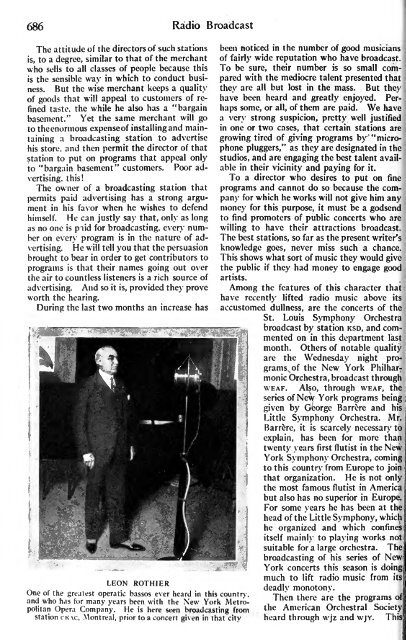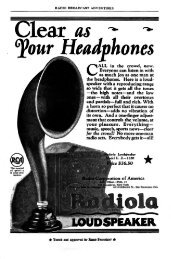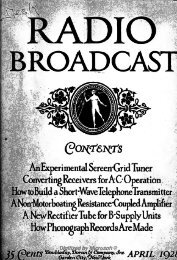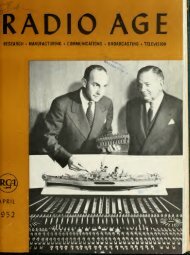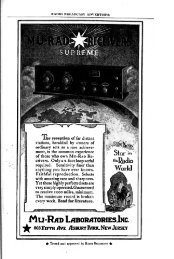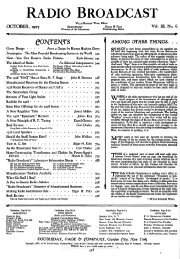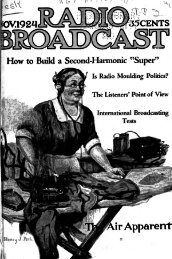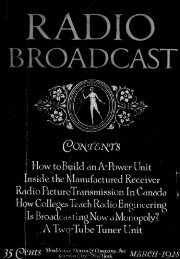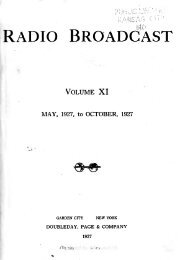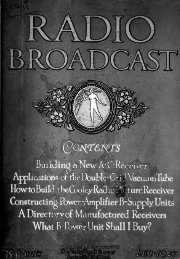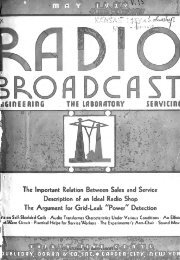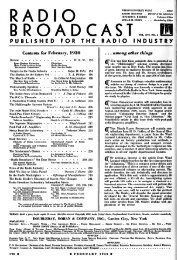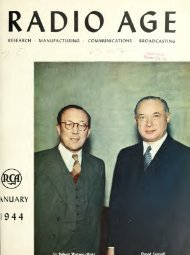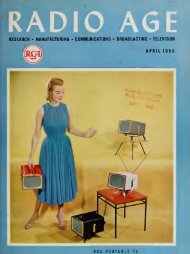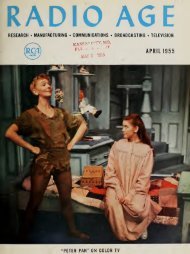Radio Broadcast - 1925, February - 113 Pages ... - VacuumTubeEra
Radio Broadcast - 1925, February - 113 Pages ... - VacuumTubeEra
Radio Broadcast - 1925, February - 113 Pages ... - VacuumTubeEra
Create successful ePaper yourself
Turn your PDF publications into a flip-book with our unique Google optimized e-Paper software.
'<br />
686 <strong>Radio</strong> <strong>Broadcast</strong><br />
The attitude of the directors of such stations<br />
is, to a degree, similar to that of the merchant<br />
who sells to all classes of people because this<br />
is the sensible way in which to conduct business.<br />
But the wise merchant keeps a quality<br />
of goods that will appeal to customers of refined<br />
taste, the while he also has a "bargain<br />
basement." Yet the same merchant will go<br />
to theenormous expenseof installing and maintaining<br />
a broadcasting station to advertise<br />
his store, and then permit the director of that<br />
station to put on programs that appeal only<br />
to "bargain basement" customers. Poor advertising,<br />
this!<br />
The owner of a broadcasting<br />
station that<br />
permits paid advertising has a strong argument<br />
in his favor when he wishes to defend<br />
himself. He can justly say that, only as long<br />
as no one is<br />
piid for broadcasting, every number<br />
on every program<br />
is in the nature of advertising.<br />
He will tell you that the persuasion<br />
brought to bear in order to get contributors to<br />
programs is that their names going out over<br />
the air to countless listeners is a rich source ,of<br />
advertising. And so it is, provided they prove<br />
worth the hearing.<br />
During the last two months an increase has<br />
LEON ROTHIER<br />
One of the greatest operatic bassos ever heard in this country,<br />
and who has for many years been with the New York Metropolitan<br />
Opera Company. He is here seen broadcasting from<br />
station CK\C, Montreal, prior to a concert given in that city<br />
been noticed in the number of good musicians<br />
of fairly wide reputation who have broadcast.<br />
To be sure, their number is so small compared<br />
with the mediocre talent presented that<br />
they are all but lost in the mass. But they<br />
have been heard and greatly enjoyed. Perhaps<br />
some, or all, of them are paid. We have<br />
a very strong suspicion, pretty well justified<br />
in one or two cases, that certain stations are<br />
growing tired of giving programs by "microphone<br />
pluggers," as they are designated in the<br />
studios, and are engaging the best talent available<br />
in their vicinity and paying for it.<br />
To a director who desires to put on fine<br />
programs and cannot do so because the company<br />
for which he works will not give him any<br />
must be a godsend<br />
money for this purpose, it<br />
to find promoters of public concerts who are<br />
willing to have their attractions broadcast.<br />
The best stations, so far as the present writer's<br />
knowledge goes, never miss such a chance.<br />
This shows what sort of music they would give<br />
the public if<br />
they had money to engage good<br />
artists.<br />
Among the features of this character that:<br />
have recently lifted radio music above its,<br />
accustomed dullness, are the concerts of the<br />
St. Louis Symphony Orchestra<br />
^^m broadcast by station KSD, and commented<br />
on in this department last)<br />
month. Others of notable quality<br />
are the Wednesday night pro--<br />
grams of the New York Philharmonic<br />
Orchestra, broadcast through<br />
WEAF. Also, through WEAF, the^<br />
series of New York programs being<br />
given by George Barrere and his<br />
Little Symphony Orchestra. Mr.<br />
Barrere, it is scarcely necessary to<br />
explain, has been for more than<br />
twenty years first flutist in the New<br />
York Symphony Orchestra, coming<br />
to this country from Europe to join<br />
that organization. He is not only<br />
the most famous flutist in America<br />
but also has no superior in Europe.<br />
For some years he has been at the<br />
head of the Little Symphony, which<br />
he organized and which confines<br />
itself mainly to playing works not<br />
suitable for a large orchestra. The<br />
broadcasting of his series of New<br />
York concerts this season is doing<br />
much to lift radio music from its<br />
deadly monotony.<br />
Then there are the programs of<br />
the American Orchestral Society<br />
heard through wjz and WJY. This


